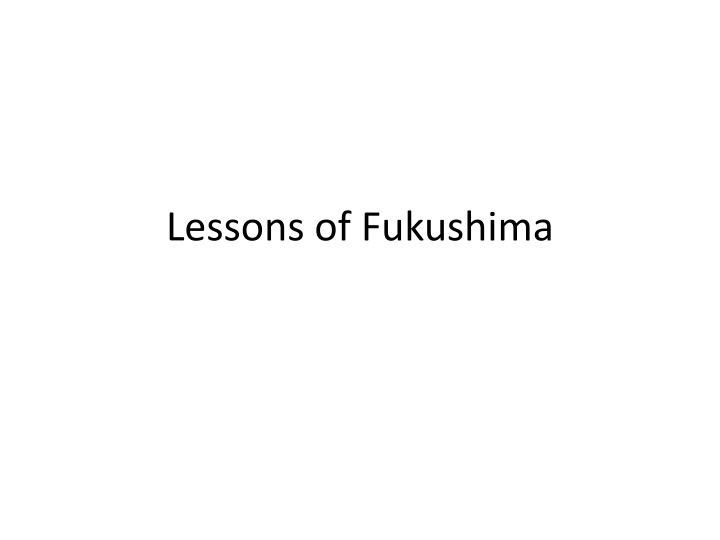
Lessons of Nuclear Power Industry and Fukushima Disaster
Explore the history of the nuclear power industry in the U.S., focusing on regulatory oversights and the Fukushima disaster. Learn about the hasty development and safety concerns, and reflect on the importance of preparing for unforeseen events to ensure the safe management of nuclear power.
Download Presentation

Please find below an Image/Link to download the presentation.
The content on the website is provided AS IS for your information and personal use only. It may not be sold, licensed, or shared on other websites without obtaining consent from the author. If you encounter any issues during the download, it is possible that the publisher has removed the file from their server.
You are allowed to download the files provided on this website for personal or commercial use, subject to the condition that they are used lawfully. All files are the property of their respective owners.
The content on the website is provided AS IS for your information and personal use only. It may not be sold, licensed, or shared on other websites without obtaining consent from the author.
E N D
Presentation Transcript
The history of nuclear power in the U.S. is one of hasty, sloppy engineering overseen by indulgent regulators who took their duty to promote nuclear power more seriously than their duty to make it safe. The industry was born out of the Eisenhower-era "atoms for peace" campaign that aimed to strip nuclear technology of its Hiroshima- born image as an instrument of destruction. Its proselytizer-in-chief was Lewis Strauss, chairman of the Atomic Energy Commission, who coined the come-on that nuclear power would be "too cheap to meter." Within a few years it became clear that nuke plants would more expensive than coal- and oil-fueled generation; by then an international juggernaut had been launched, spurred by U.S. trade credits to sell American-made reactors overseas and by manufacturers such as GE and Westinghouse offering domestic utilities power reactors at loss-leader prices. Los Angeles Times, March 10, 2014
Do you believe regulators took their duty to promote nuclear power more seriously than their duty to make it safe? A. Yes B. No C. Have not decided
Fukushima is yet another reminder of a lesson that the nuclear power industry has had to learn over and over again--that one must prepare even for occurrences you think are safely out of the range of probability, like earthquakes and tsunamis. The heart of the disaster at Fukushima was a dreaded "station blackout" caused by flooding, in which the complete absence of electrical power made the entire array of safety valves and emergency cooling systems inoperable and rendered the plant operators effectively blind to what was happening inside the reactor containment vessels. A station blackout, as the authors of "Fukushima" observe, is a race against time to restore power before the emergency batteries run down; at that point cooling ceases and the reactor core begins to melt down. Los Angeles Times, March 10, 2014
Can nuclear power be managed properly if the lessons of Fukushima are ignored? A. Yes B. No C. All of the answers are not in
